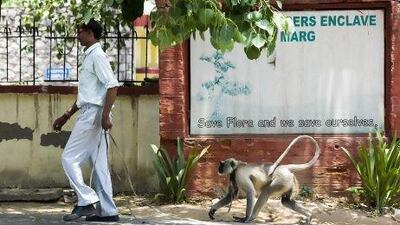NEW DELHI // Gul Khan barks and grunts as he roams the neighbourhood behind India's parliament building, but not in teeth-gnashing frustration at government red tape and corruption.
Rather, Mr Khan is mimicking another primate - specifically, the distinctive whoofs and glottal stops of the langur monkey.
His job is to curb the shenanigans of the rhesus macaque, packs of which cruise Delhi's streets, snatching food from the unwitting, nipping at the heels of the unwary and even breaking into homes - in general, making a public nuisance of themselves.
For as long as anyone here can remember, the monkey catchers of Delhi have employed the larger grey langurs to keep the rhesus macaques in check.
But India's wildlife and forest ministry has decreed that the black-faced, long-tailed grey langurs can no longer be used to police city streets. By the end of this month, the monkey catchers must hand over their trusty assistants to the zoo or release them.
It has been all too much for Mr Khan. Earlier this month, he took his three grey langurs - Mangal Singh, Lajwanti and Lilavati - into a forest outside Delhi and set them free.
Two weeks later, he is still distraught as he imitates the yips and yelps of his former friends to carry on with his job.
"They were not my pets," he said between the oral calisthenics. "They were like family."
The grey langur has been a protected species in India since 1972, which means it cannot be kept in captivity. Anyone convicted of doing so faces a fine and a three-year jail term, under the Indian Penal Code.
But not everyone has been deterred by the ban.
Murari, who uses only one name, decided to keep his langur. He patrols one of Delhi's poshest enclaves, the diplomatic area. He said the residents know he is not allowed to use the monkey, but are more concerned with keeping macaques out of their homes and offices.
When Mr Murari patrols the area with his langur, also called Mangal Singh, he stays away from the main streets to avoid being spotted by police. When Mangal Singh gets tired, Mr Murari ties him to a tree, where the monkey feeds on shoots and leaves.
Mr Murari has been in the business for more than a decade, and not all of his partners have been as easy to work with as Mangal Singh. One ran away, another had to be released into the wild after it bit him.
Mangal Singh, he said, was given to him as a gift by a friend who breeds langurs. "I take care of him and he takes care of the neighbourhood," Mr Murari said. "We earn a living together."
There is no official figure of the number of langurs employed by hundreds of monkey catchers. The menace they combat is real: the tyranny of the macaques is legendary.
In 2007, Sawinder Singh Bajwa, the deputy mayor of Delhi, fell from his first-floor balcony when his home was attacked by a troop of monkeys and died a day later from the head injuries.
Everyone it seems, has a story to tell about a monkey attack.
Manoj Kesari, who sells fried noodles from a cart for a living, was returning home with bags of groceries last month when a pack of monkeys approached.
"I froze," Mr Kesari said. "All the horrible tales about monkeys snatching bags and purses came to mind."
But instead of simply snatching Mr Kesari's bags, one of the monkeys first perched on his head and slapped him repeatedly. After that, a couple of other monkeys ripped the bags from his hands and ran away.
"It was humiliating," he said.
Mr Kesari said neighbourhoods depended on men like Mr Khan to keep the monkeys away, "so our children can go to school safely and our wives can walk around without fear of being attacked".
Monkeys are revered in Hinduism, and devout Hindus often feed them, encouraging them to urban areas. As they become accustomed humans they can become more aggressive, stealing food rather than waiting for handouts.
The monkey problem has grown in the wake of the langur ban, and a deal is in the works between India's Central Zoo Authority, the Wildlife of Authority of India and the California National Primate Research Centre.
They hope to address the macaque menace as "a behavioural problem", said BS Bonal, the secretary of the Central Zoo Authority.
Kartick Satyanarayan, the co-founder of Delhi-based Wildlife SOS, which rescues wild animals in distress, said the ban would prevent the abuse of the grey langur, which are often chained and confined when not being made to work.
All this holds little meaning for Mr Khan, the monkey catcher, who spends his weekends in the forest in Faridabad, about 35 kilometres south of Delhi city, where his grey langur monkeys now roam free.
He walks into the forest making the langur sounds that he uses to scare macaques. "I call out to them," he said. "They come by if they are around, and I bring them treats like bananas and apples. They love apples."
sbhattacharya@thenational.ae
twitter: For breaking news from the Gulf, the Middle East and around the globe follow The National World. Follow us

Monkey business no laughing matter in India
Packs of rhesus macaques cruise Delhi's streets, snatching food from the unwitting, nipping at the heels of the unwary and even breaking into homes. Suryatapa Bhattacharya reports on the business of monkey catching
Most popular today
